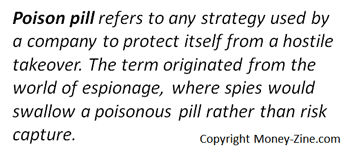One of the ways a company can protect itself from a hostile takeover bid is by adopting a poison pill defense. Generally, this term is used to describe several approaches the target company can employ to make the potential acquisition less desirable. In this article, we're going to talk about a strategy that target companies can use to protect themselves from hostile takeovers. As part of that discussion, we're going to provide a definition of the term "poison pill," as well as present some history of the phrase. Since the term is often used to describe one or more of several different strategies, we'll give examples of each approach.
Poison Pills
The term poison pill is defined as any corporate provision, or strategy, that is used by a company to protect itself from a hostile takeover bid. The term originated from the world of espionage, where spies were instructed to swallow a poisonous pill rather than risk capture. The phrase was first used in a business setting by Martin Lipton, of Wachtell, Lipton, Rosen, and Katz. Lipton invented the poison pill defense during a takeover battle in Texas back in 1982. At the time, T. Boone Pickens was trying to acquire General American Oil. Lipton advised the company's Board of Directors to flood the market with new shares of stock. By diluting the stock purchased by Pickens, the company could regain control of its destiny. The strategy was eventually ruled as a legal defense mechanism by the Delaware Supreme Court in 1985, and was legally recognized for the first time in the case of Moran v. Household International.
Poison Pill Provisions
These defensive techniques have evolved over time, and while this strategy may take several forms, the most common structures include:
Preferred Stock Plans: this is preferred stock registered with the SEC and paid as a dividend to common shareholders. This preferred stock has an important feature: it is convertible to common stock only after the takeover is completed. This strategy both dilutes the ownership of the acquiring company (which is highly undesirable for the acquirer) as well as increases the cost of the merger.
Flip-Over Plans: this allows shareholders to purchase shares of common stock in the new company at a substantial discount after the merger. While this approach is simpler to implement than a preferred stock plan, it does not prevent a company from purchasing a controlling share of the target.
Flip-In Plans: this strategy provides shareholders of the target company with the right to purchase additional stock in the target company at substantial discounts. The right to purchase stock occurs before the merger is finalized, and the provision is usually triggered when the acquirer owns greater than a 20% share of the target's stock.
Back-End Plans: this approach provides shareholders of the target company with the right to cash or debt securities at a price established by the company's Board of Directors. By doing so, the target company has essentially established an above-market selling price for the company.
Poison Puts: this is a bond that allows investors to cash in the security before it matures, if the target company is engaged in a hostile takeover attempt. The poison put places pressure on the acquiring company to raise substantial sums of money to pay off the owners of the puts.
Escape Clauses
When poison pills are put into place by management, they are usually accompanied by an escape clause. The escape clause allows the issuing company to redeem the poison pill via a small payment to the shareholder.

One of the advantages of the escape clause is that it prevents dilution of ownership if the acquiring company is not viewed as hostile. For example, this can occur when the acquiring company is offering shareholders a substantial premium over the current market price of their stock.
Popularity
An often-cited study conducted by the ISS Governance Research service indicates that 46% of companies in the S&P 500 Index had a poison pill defense in-place at the end of 2005. This is down from the nearly 54% level a year earlier. This reduction appears to be a trend, as the study noted the percentage of companies with such a defense has been declining since 2002, when 60% of all S&P 500 companies had such provisions.
Effectiveness
The rise of the poison pill defense back in 1982 is of no surprise. At that time, corporate raiders such as Carl Icahn and T. Boone Pickens were buying companies, breaking them apart, and selling them off in such a way that additional shareholder value was created. Unfortunately, employees working for these companies, including senior management, often lost their jobs in the process. The fact that this practice can create additional shareholder value calls into question its value, since the management of poorly run companies can hide behind such a defense. On the other hand, poison pills are effective at delaying the speed of any takeover, and can often result in higher premiums paid to shareholders during M&A (merger and acquisition) negotiations.
About the Author - Poison Pill Defense




.jpg)